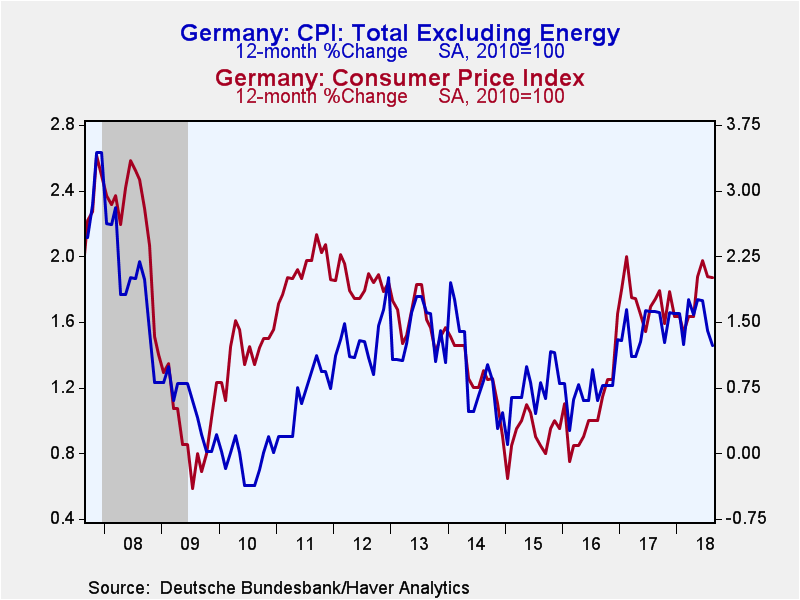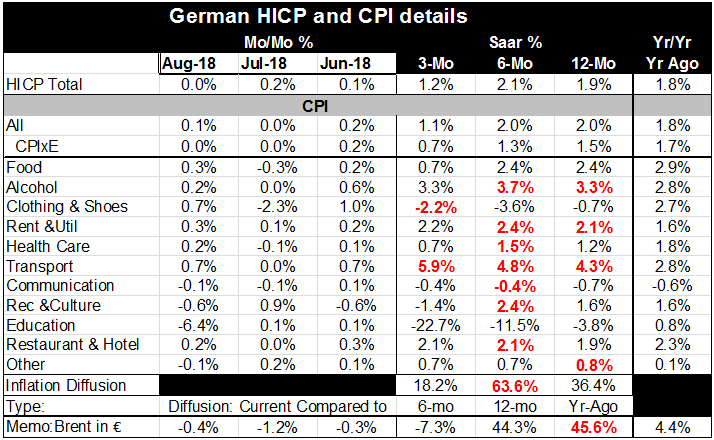 Global| Sep 13 2018
Global| Sep 13 2018German and EMU Inflation Behave
Summary
The German HICP is flat in August; its domestic CPI is up by 0.1% and the CPI excluding energy is flat. German inflation measured from 12-months to 6-months to 3-months shows a loss of momentum with year over year inflation at 1.9% to [...]
 The German HICP is flat in August; its domestic CPI is up by 0.1% and the CPI excluding energy is flat. German inflation measured from 12-months to 6-months to 3-months shows a loss of momentum with year over year inflation at 1.9% to 2% depending on the gauge and with 3-month inflation at a pace of 1.2% or 1.1% depending on the gauge. Domestic ex-energy CPI inflation is also moving lower dropping from a 1.5% rise over 12-months to show a pace of 0.7%, well-under 1% over the last three months.
The German HICP is flat in August; its domestic CPI is up by 0.1% and the CPI excluding energy is flat. German inflation measured from 12-months to 6-months to 3-months shows a loss of momentum with year over year inflation at 1.9% to 2% depending on the gauge and with 3-month inflation at a pace of 1.2% or 1.1% depending on the gauge. Domestic ex-energy CPI inflation is also moving lower dropping from a 1.5% rise over 12-months to show a pace of 0.7%, well-under 1% over the last three months.
Of course, the ECB targets inflation of a little less than 2% but only targets inflation for the EMU Area as a whole. Still there is not much in these German figures this month for the ECB not to like.
Most importantly Inflation while near the ECB’s borderline pace for all of EMU is nonetheless on a declining path. Both the HICP and the CPI headlines as well as the CPI excluding energy show decelerating inflation.
More broadly inflation only accelerates in two of eleven components over 3-months. Inflation accelerates in 63 pert of the components over six-months but only in 18% of them over 3-months. Over 12-months inflation accelerates compared to its pace of one year ago in only 36% of the categories. After a bit of a pick up over six months German prices have settled back down. Expressed in euro terms oil prices have fallen in each of the last three months.
Germany’s experience is somewhat comparable to the other large EMU economies. France, Italy and Spain all have headline 3-month inflation slightly below 12-month inflation although in all-three countries inflation is above the 2% mark over 12-months. But France Spain and Italy all report much lower rates of inflation for core or ex-energy inflation. For France the pace over 12-months is 1.4% for Italy it is 0.9% and for Spain it is 0.8%. Both France and Spain also show their rates (ex-energy for France and Core for Spain) lower over 3-months than for 12-months. Italy shows its core rate higher over 3-months than over 12-months but its annualized pace over 3-months still is only at a rate of 1.2%.
For all of EMU inflation is at a 2% pace and edges up to a 2.3% annualized rate over three-months. But EMU core inflation runs at 1.1% over 12-months and sinks to 0.7% over 3-months.
On balance inflation in Germany, in the large EMU countries and for the Euro Zone as whole is quite well behaved even admitting that there is a flaw here and there. German inflation shows solid behavior as the breadth of inflation across categories is reinforcing the trend of mild inflation and of a slowing. The ECB recently has been taking its queue from the weaker core inflation rate. This month once again the ECB has opted to keep its policies on hold. That decision was taken just today at a regular ECB policy meeting. Inflation is not a problem and yet concerns about growth and the impact of the ongoing trade wars continues to play a role in putting central bankers back on their heels.

Robert Brusca
AuthorMore in Author Profile »Robert A. Brusca is Chief Economist of Fact and Opinion Economics, a consulting firm he founded in Manhattan. He has been an economist on Wall Street for over 25 years. He has visited central banking and large institutional clients in over 30 countries in his career as an economist. Mr. Brusca was a Divisional Research Chief at the Federal Reserve Bank of NY (Chief of the International Financial markets Division), a Fed Watcher at Irving Trust and Chief Economist at Nikko Securities International. He is widely quoted and appears in various media. Mr. Brusca holds an MA and Ph.D. in economics from Michigan State University and a BA in Economics from the University of Michigan. His research pursues his strong interests in non aligned policy economics as well as international economics. FAO Economics’ research targets investors to assist them in making better investment decisions in stocks, bonds and in a variety of international assets. The company does not manage money and has no conflicts in giving economic advice.
More Economy in Brief
 Global| Feb 05 2026
Global| Feb 05 2026Charts of the Week: Balanced Policy, Resilient Data and AI Narratives
by:Andrew Cates






